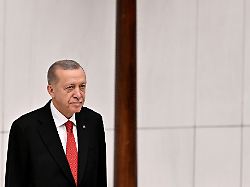“Impossible necessity”
Erdogan names conditions for peace in the Middle East
October 8, 2023, 7:53 p.m
As a result of Hamas’ major attack on Israel, the focus is shifting back to the fundamental Middle East conflict. A solution position advocated internationally by many states – including Turkish President Erdogan – is the creation of two independent states of Palestine and Israel.
After Hamas’ major attack on Israel, Turkish President Recep Tayyip Erdogan initially called on both sides to avoid escalation. Now, at the opening of a church in Istanbul, he discussed the steps he believes are necessary for sustainable peace in the Middle East. “A lasting peace in the Middle East is only possible with the final solution to the Palestine-Israel problem,” said Erdogan.
As long as the Palestinian question is not resolved, the region will have to long for peace. Erdogan also made comments about his ideas about the solution: “It is important to maintain the two-state solution,” said the Turkish president. “The creation of an independent Palestinian state with geographical integrity within the 1967 borders and Jerusalem as its capital is a necessity that cannot be postponed.”
Two-state solution, but how?
The two-state solution is one that is supported internationally by many parties and intermediaries. The US government under Joe Biden has been promoting it for years. After Hamas’ major attack on Israel, the Chinese Foreign Ministry quickly announced that the stagnation in the peace process between the Palestinians and Israel was untenable and that the fundamental way out of the conflict was “the implementation of the two-state solution and the establishment of an independent Palestinian state ” lie.
The crux of the two-state solution is, among other things, the agreement on a border between Palestinians and Israel and the status of Jerusalem. Israel had already declared the western part of Jerusalem its capital in 1950. In the Six-Day War of 1967, Israel captured the Old City and the eastern part of the city. In 1980, the Knesset passed a law that designates the complete and unified Jerusalem as the capital of Israel and has de facto constitutional status. The UN Security Council declared the annexation null and void in Resolution 478 and has since reaffirmed this on several occasions. The status of Jerusalem remains controversial today.
The official Turkish position is that East Jerusalem must be the capital for the Palestinians. The previous US administration under Donald Trump had moved closer to the position of the Israeli government and ordered the US embassy to be moved from Tel Aviv to Jerusalem.
